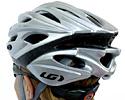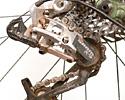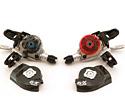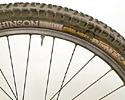Louis Garneau Carbon Titan helmet - the strong, silent type
Rear exhaust ports evacuate
hot air.
Photo ©: Jonathan Devich

|
Louis Garneau doesn't spare its top-end Carbon Titan helmet from
the exotic material treatment: 'white' carbon fiber reinforces the
largest of the 22 vents from splitting open during impact and a
titanium ring embedded in the helmet's circumference provides additional
structural support when things go wrong. Even with its extra hardware,
our small Titan Carbon is competitively lightweight at just 265g
(9.4oz).
Proper fit is provided by a number of features, including the easy-to-adjust
Keylock strap adjusters and Louis Garneau's unique Spiderlock Elite
retention system which uses a large rubber-coated knob to snug the
helmet around the occipital bone (otherwise known as that big bump
on the back of your noggin). The rubber coating (and detented stops)
makes for easy one-handed adjustments, and an eight-position height
adjustment allows for a truly custom fit as well as admirable ponytail
compatibility.
The Titan Carbon provided a stable fit both on- and off-road as
well as airy ventilation, at least in the cool-to-moderately warm
conditions in which the helmet was tested. However, while the number
of vents in the Titan Carbon is certainly impressive, the relative
lack of internal channeling puts it a half-step behind its high-end
competition. Off-road riders will also want to note, however, that
the helmet does not include a visor, nor does it have any built-in
provision for one. Otherwise, though, there's virtually nothing
to complain about as the Titan Carbon provides a stylish, understated,
comfortable, and highly adjustable way to protect your personal
data module.
Weight: 265g (9.4oz)
Price: US$169.99 (including storage bag)
Pros: Light, easy to adjust, comfortable, classy styling,
relatively airy
Cons: No option for a visor, could use more internal channeling
Cyclingnews rating: 
PhotographyFor a thumbnail gallery of these images, click here
Images by
Jonathan Devich/epicimages.us

SRAM X.9 rear derailleur and trigger shifters - few reasons to
pay more
The new X.9 rear derailleur
held up well
Photo ©: James Huang

|
Trickle-down technology is the boon for all performance-loving
(but cash-strapped) cyclists out there, and few bits in recent memory
have exemplified this trend more than the latest round of SRAM's
X.9 MTB transmission.
The initial X.9 generation offered up competent capabilities, but
it was hardly awe-inspiring. While it included most of the same
features as the top-tier X.0 (including the outstanding 1:1 cable
pull ratio and thumb-thumb trigger configuration), it just didn't
feel as good in use and didn't quite offer up the same reassuring
tactile feel as its big brother. X.0's characteristic 'Pop! Pop!'
was translated into more of a muffled 'puff puff'… as if it were
being suffocated with a pillow.
That gap narrowed to virtually nil for 2007 as SRAM gave X.9 a
significant functional and visual overhaul. New rear derailleur
features include a decidedly more X.0-like appearance that at least
seems more rigid than before, a forged aluminum B-knuckle for improved
durability (original cast aluminum ones were somewhat prone to failure),
and a sealed bearing lower pulley.
Upgraded X.9 internals utilize
Zero Loss Travel guts.
Photo ©: James Huang

|
As much as the rear derailleur has been improved, though, changes
to the new X.9 trigger shifter are much more substantial. In fact,
the new X.9 trigger is virtually identical to X.0 inside and out,
with the same clamshell-style body, two-position clamp, and Zero
Loss Travel internals. Cost-cutting measures include the substitution
of bushings instead of cartridge bearings in the shaft pivots, a
non-adjustable pull lever, and a plastic instead of carbon fiber
shifter cover. Weight on the bits is also nearly X.0-like at 229g
and 223g for the trigger shifter pair and long cage rear derailleur,
respectively.
Some may lament the loss of the original X.9's gear indicator in
the new shifter, but that's a small price to pay for the resultant
quantum leap in performance as it's now simply impossible to discern
any differences between X.9 and X.0 on the trail. Tactile feedback
is just as positive, and shift quality is easily on par with SRAM's
best offering. Other than the minor weight penalty and what will
likely be a small hit in long-term durability, the reasons for going
with X.0 seem based more in fashion now than function, especially
given X.9's incredible value. Yup, it's that good.
Weight: 229g (trigger shifters, without included Teflon-coated
cables); 223g (long cage rear derailleur)
Price: US$128 (trigger shifters); US$99 (rear derailleur)
Pros: X.0-like shift quality, X.0-like appearance, stellar
shifter fit and feel
Cons: might cut into sales of X.0
Cyclingnews rating: 
PhotographyFor a thumbnail gallery of these images, click here
Images by
James Huang/Cyclingnews.com

Hutchinson Piranha MRC Medium Tubeless tires - rails for your
bike
Hutchinson's new Piranha
tread
Photo ©: James Huang

|
Much attention is paid to a plethora of bicycle components, but
few can have as much of an impact on bicycle performance than tire
selection. Hutchinson's latest round of off-road tires includes
the intriguing Piranha, which pairs aggressively tall cornering
knobs with a decidedly low-profile center tread. Hutchinson offers
the Piranha in several different flavors ranging from skinny cross
country widths to beefier all-mountain casings. Our 26x2.3" Piranha
MRC Medium Tubeless test tires fell at the latter end of that scale
with an actual weight of 966g each (91g more than advertised). To
Hutchinson's credit, that weight incorporates a beefy 66tpi, true
UST casing with reinforced sidewalls and a polyamide belt under
the tread along with medium rebound rubber for enhanced grip over
more XC-specific compounds.
When mounted up on a 5" travel trail bike, we found the Piranha
MRC Medium Tubeless to largely deliver on Hutchinson's cornering
grip promises in hardpack and loose-over-hardpack conditions (sorry,
we weren't able to try them in soft or muddy terrains). Adhesion
at the limits was excellent and also reasonably forgiving in spite
of the tire's decidedly square-edged profile. The distinct lack
of intermediate knobs, however, made for somewhat odd transitions
but we quickly adjusted to the feel nonetheless.
Reinforced UST casing
Photo ©: James Huang

|
The dramatically shaved-down center knobs still managed to provide
admirable climbing and braking traction, but unfortunately seemed
to do little to enhance rolling speed. This may be related to the
slower rebounding rubber, but the incredibly square profile (which
makes a Panaracer Smoke look spherical in comparison) and typically
low inflation pressures also make for a wide enough contact patch
that the bike can practically stand upright by itself. The reinforced
casing also held up well in our abusive Front Range environment
with not a single puncture or pinch flat to speak of.
If grip is what you're after, the Piranha MRC Medium Tubeless certainly
offers it up in spades (and we can only imagine what the full knob
height Barracuda would feel like). However, that grip does come
at the price of rolling efficiency so potential buyers should keep
that in mind when assigning priorities.
Weight: 966g
Price: US$60
Pros: Outstanding cornering grip with reasonably forgiving
characteristics at the limit, reinforced casing
Cons: Hefty weight, slow rolling in spite of shaved center
knobs, lack of transition knobs
Cyclingnews rating: 
PhotographyFor a thumbnail gallery of these images, click here
Images by
James Huang/Cyclingnews.com

|







